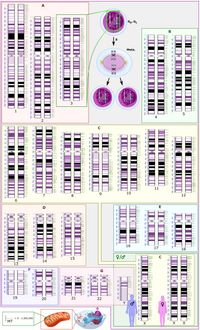
Photo from wikipedia
BACKGROUND DNA biobanks frequently obtain broad permissions from sample donors, who agree to allow their biospecimens to be used for a variety of future purposes. A limitation of this approach… Click to show full abstract
BACKGROUND DNA biobanks frequently obtain broad permissions from sample donors, who agree to allow their biospecimens to be used for a variety of future purposes. A limitation of this approach is that it may not be possible to discuss or anticipate all potential uses of biospecimens at the time patient consent is obtained. We surveyed biobank participants to clarify their views regarding the need to be informed about research involving whole genome sequencing (WGS). METHODS We invited 1200 participants in the Mayo Clinic Biobank to complete a survey inquiring about their support for WGS; their interest in being recontacted before WGS of their biospecimens; whether they would consent to WGS if asked; and the acceptability of proceeding with WGS if sample donors could not be reached. RESULTS Six hundred eighty-seven biobank participants returned completed surveys (57% response). More than 96% of biobank participants were supportive of WGS and would give permission for WGS of their sample, if asked. Nonetheless, 61% of biobank participants felt they should be recontacted before WGS was done. Participants were divided regarding the permissibility of conducting WGS if efforts to recontact sample donors were unsuccessful. DISCUSSION Our findings highlight a potential discrepancy between the broad permissions granted by biobank participants at the time they donated biospecimens and their views about the application of WGS to their samples. Biobank participants appear to value the ability to confirm their commitment to genetic research when the studies in question involve WGS, a technological capacity they may not have anticipated at the time they donated their biospecimens. Efforts to reevaluate biobank participants' views about the acceptability of new technologies may help to ensure alignment of participants' current beliefs and research applications that would have been difficult to anticipate at the time biospecimens were collected.
Journal Title: Biopreservation and biobanking
Year Published: 2019
Link to full text (if available)
Share on Social Media: Sign Up to like & get
recommendations!